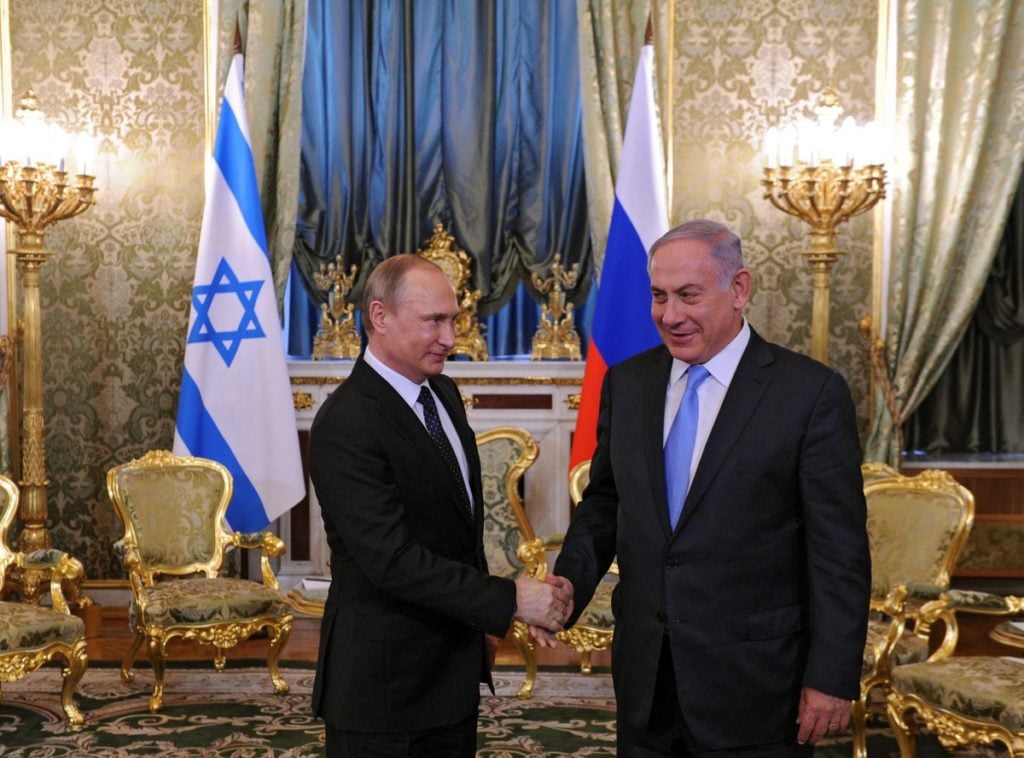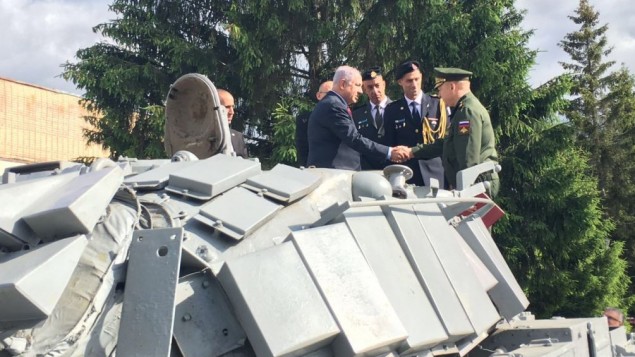
Earlier this month, the Israeli Prime Minister Benjamin Netanyahu visited Moscow for the third time since last September to celebrate the 25th anniversary of restoring Russian-Israeli diplomatic relations. During the trip, Netanyahu received an unusual gift: the Magach tank. The Syrian army captured the machine in 1982 as a trophy during the First Lebanon War and transferred it to the Soviets that later moved it to the military museum in Kubinka near Moscow. The return of the Magach tank to Israel was broadly covered by the Russian media as it symbolized the new era in Israeli-Russian relations, free from the Cold War era rivalry and fostering mutual dialogue.
The Israeli-Russian rapprochement is not a Netanyahu’s preference but rather a tribute to the new reality faced by Israel. After being present in the Middle East for 50 years, the United States has now decided to gradually diminish its influence after its spectacular foreign policy failures that have partly contributed to the rise of ISIS. In contrast, Russia is actively exploiting this emerging power vacuum to establishing itself as pivotal nation within the region.
Obama’s administration policy led to a significant deterioration of relations with Israel. In effect, Netanyahu has only visited the United States once for the past nine months and, unprecedentedly, canceled an invitation to visit the White House in March. Obama still has half of 2016 left in the office, however, it is still unclear how long will it take the next administration to restore relations. Therefore, a ‘reset’ with Russia could be very helpful for Netanyahu’s medium-term goals.
While engaging with Russia, Netanyahu has, first and foremost, the Israeli national security in mind. As Russia coordinates closely with the Iranian forces in Syria and, allegedly, Lebanese Hezbollah, the rapprochement might be the best solution to keep the northern border safe. Furthermore, enhanced cooperation would minimize risks of clashing with the Russian planes over Syria.
Finally, the Israeli leader wants to secure enough space to maneuver independently in the diplomatic sphere to better advance the country’s national interests. The rapprochement might help Israel to overcome the rift with the Obama administration and extract limited support from the Kremlin. As the White House and France might back a future U.N. Security Council resolution against Israeli settlements on the Palestinian territories, Netanyahu needs Russia’s neutrality or even opposition.
In April, Netanyahu came for a three-day visit to Moscow right after the Palestinian Authority President Mahmoud Abbas. A couple of weeks ago Sergei Lavrov, shortly after the Israeli Prime Minister’s departure, met with the Palestinian Authority Foreign Minister Riyad al-Malki. Netanyahu is hoping that by supporting the Kremlin’s peace initiatives and, henceforth, facilitating Moscow’s international status as a mediator in the Israeli-Palestinian conflict, the Kremlin, in return, might soften its hardline policy against Israel.
Netanyahu’s efforts already paid off as the Russian Deputy Foreign Minister Mikhail Bogdanov advocated for concrete territorial exchanges between Israel and the Arabs in Judea and Samaria, in order to preserve Israeli settlements. Bogdanov unusually stated: “Such settlements may remain in some regions with the understanding that in exchange for territories with Israeli settlements, Palestinians will get an appropriate compensation in the form of parts of the territory.”

Prime Minister Benjamin Netanyahu attends an official ceremony to receive an IDF tank captured during the First Lebanon War, in Moscow on June 8, 2016. (GPO)
By aligning with the Kremlin Netanyahu is also pursuing certain domestic political goals. It is not a secret that many Russia-speaking Jews are leaning to the center-right and conservative parties in Israel. Therefore, by supporting the Kremlin, with its unofficial national ideology of promoting ‘traditional values,’ Netanyahu is hoping to appeal to the Israeli citizens who have emigrated from the former USSR countries and constitute a strong electoral base for the Likud party, as well as better bridge relations with the Russian elite. The growth of the ‘humanitarian ties’ between the two nations due to the large number of Russian Jews was also highlighted by Putin in his speech.
The Russian-speaking population of Israel accounts 1.5 million citizens and, yet, its political representation is lagging behind. However, the appointment of the Defense Minister Avigdor Lieberman implies an emergence of Russian-speaking Israelis in the political sphere. Handpicked by Netanyahu himself, Lieberman is the first immigrant from the former USSR to be put in charge of the Israeli military—a symbol of the growing Russian-Israeli friendship and the new face of the Russian-speaking Israelis.